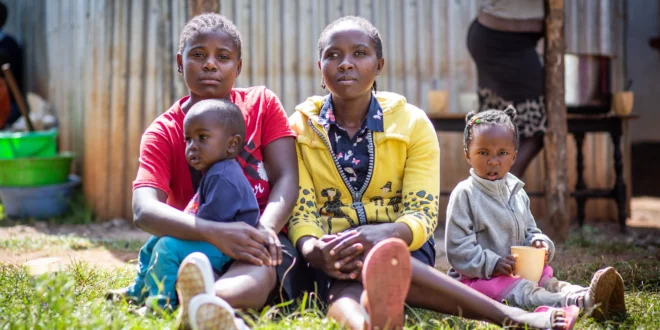Understanding the Impact of Climate Shocks on Mental Health
Climatic shocks and environmental changes are increasingly recognized as one of the most significant threats to human health in the 21st century. Extreme weather events, such as heatwaves, tropical cyclones, heavy rainfall, floods, wildfires, and droughts, can have severe effects on both mental and physical well-being. Individuals living in impoverished areas and rural communities are often the hardest hit due to limited access to essential resources like clean water, food, and healthcare.
Most research on the relationship between climate change and mental health has been conducted outside of Africa. However, there is a growing need for more studies that focus on African settings, where communities also face the challenges of climate change. A recent study led by researchers from the Brain and Mind Institute and myself aimed to explore the effects of exposure to climate change shocks on depressive symptoms and suicidal thoughts among women in Kenya’s coastal Kilifi region.
The Study Setting and Focus
The Kilifi region is one of Kenya’s poorest areas, experiencing frequent droughts, heatwaves, and reduced rainfall between 2010 and 2022. Flooding occurred in 2024, causing significant human suffering. The study focused on two groups of women: those from informal rural slum-like households without running water and flushing toilets, and those from more stable rural households with basic amenities. This approach allowed us to examine how different socio-economic contexts influence mental health outcomes.
Women were chosen as the focus group because it was challenging to gather a sufficient sample size of men, who often return home late due to work commitments. The findings revealed strong associations between climate shocks and negative mental health outcomes. Women from informal settlements showed a 10.8 percentage point higher incidence of depressive symptoms compared to their counterparts in more stable areas. This mental health crisis has far-reaching consequences, increasing instances of suicidal thoughts among vulnerable women.
Economic and Environmental Stresses
In many Kenyan rural areas, women play a crucial role as primary breadwinners. They engage in various income-generating activities, including farming and small-scale trade, contributing to both their families and the broader community. However, their mental well-being is often affected by economic hardships, social pressures, and lack of support, which can negatively impact household stability.
When women experience stress, anxiety, or depression, it affects not only their health but also their ability to provide for and nurture their families. The interplay between economic and environmental stresses highlights the urgent need for action to address these challenges.
Climate Shocks and Mental Health in Rural Communities
Residents of Kaloleni and Rabai, where the study was centered, rely on informal subsistence agriculture for survival. The yield is low and unpredictable, contributing little to the local economy. These communities face poor housing, overcrowding, lack of clean water, sanitation, and transport facilities. High unemployment rates and poorly equipped schools further hinder healthy community development.
The study sought to answer several key questions:
- What impact do climate shocks (less rain, more heat, drought) exert on the depressive symptoms and suicidal thoughts of these women?
- Are there regional differences in the impact of the climate shocks?
- How do climate shocks and high food prices put pressure on the mental health outcomes of these women?
A 15-item questionnaire was used to assess perceptions of rainfall patterns, complemented by meteorological data. This combined approach helped analyze how variations in climate shocks might influence mental health outcomes, specifically depression and suicidal thoughts.
Methodology and Findings
A widely used questionnaire was employed to assess the presence and severity of nine common depression symptoms. Respondents rated how often they experienced each symptom over the past two weeks using a scale from 0 (not at all) to 3 (nearly every day). A total of 14,801 participants completed the surveys and were included in the analysis.
Data from the study revealed stark correlations between climatic conditions and mental health issues. A reduction in rainfall correlated with a 28.7% increase in suicidal thoughts, indicating the psychological burden of uncertainty and loss of livelihood. Heat waves contributed to a 14.9% rise in suicidal thoughts, while drought conditions led to a 36.7% increase. This suggests that the stressful nature of drought stoked a state of hopelessness.
The cumulative effects of climate change and rising food prices led to a staggering 48.3% increase in suicidal thoughts among rural women from informal settings.
Moving Forward
The Kenyan government has been working with various stakeholders to address the impact of climate shocks. However, meaningful practical programs on the ground to assist vulnerable populations are still lacking. Policymakers must develop and implement mental health services tailored to the needs of communities affected by climate change.
The provision of mental health services, along with distribution of food, water, agricultural inputs, and cash transfers after climate-related shocks, is recommended. These strategies are already being implemented in countries such as India.
The government must acknowledge both the physical and mental health effects of climate change. Addressing mental and emotional well-being is essential for building resilient communities capable of withstanding future climate shocks.
Mental health support should be integrated into climate adaptation strategies. This could significantly improve the quality of life for vulnerable populations in Kenya. Initiatives promoting mental health awareness, providing access to care, and creating community support networks are essential steps forward.
By empowering women and fostering resilience within communities, Kenya can begin to mitigate the long-term impacts of climate change on both the environment and the mental health of its citizens.
 Info Malang Raya Its All About World News
Info Malang Raya Its All About World News




